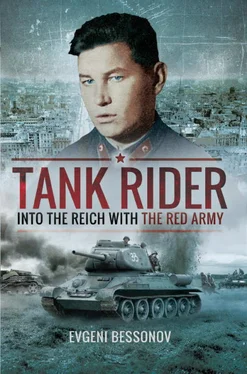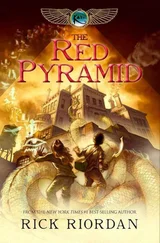Brigade commander Colonel Turkin arrived and again sent me forward as a vanguard on three tanks, gave me a route of advance and pointed out a place where I should stop for a halt. The depleted platoon of Shakulo, who was wounded, was also with me. The vanguard moved forward some 5 to 7 kilometres from the main body of the Brigade, maintaining communication over tank radio in order to warn the main body about enemy forces. The vanguard is always the first unit to receive a blow from the enemy, in some cases a deadly blow from an ambush, so one always had to be careful.
That was the beginning of a long journey on Polish soil, up to the Oder and then to the Neisse river. In general, one has to know how to ride on a tank, how to jump off it and how to mount it. We had a special training session for that during our time in reserve. It is harder to do in wintertime than in summertime; besides that, armour is cold and there is no protection from the wind, and one has to hold on to something in order not to fall from the tank during a cross-country march. There were railings on the tank’s turret, but they were not enough. There was an incident when during a cross-country march one soldier was knocked off the tank by a tree branch, which hooked round neck and threw him on the ground. No one noticed his disappearing – apparently, everyone was asleep, and the soldier had to travel on alone on foot, following the tank tracks. It was good that the column stopped soon after the incident and the soldier, who was from Petr Shakulo’s platoon, was able to catch up with the battalion. For a long time the man was the butt of friendly jokes from the ‘Slavs’.
In wintertime soldiers tried to sit behind the turret, on the tank’s warm radiator. I would sometimes stay behind the turret, where I sat and dozed off at night and stood during the day and looked forward, in order to see the terrain and be able to control the situation. I would normally be on the second or third tank, as the radio worked better there. Continuous communication is a cornerstone of combat, especially when you are to the enemy’s rear and when we were detached from the main body of the Brigade. Our mission was to attack along the route of Keltse [Pesuv], Lodz, Petrokov (or Petrokuv) [Piotrkow], Ostruv [Ostrow], Kratoshki [Krotszyn] and on to the Oder, to Keben on the other side of the river. It was generally dangerous to be in front of the Brigade. If you missed the enemy, all its forces would crush on you and soldiers of your platoon. On the other hand, I felt quite free – no command around, and I was my own boss. Besides that, we had lots of food we had captured from Germans and we never stayed hungry, and we had some alcohol to wet our whistles. The grey hilly fields of Poland were lying before our eyes – fields covered by snow, fields of poor peasants. To the right or to the left of the road there were small villages, some ten buildings each. Shots sounded from them sometimes, but our order was – just forward. We would report the name of a village, from which we were fired upon, but we never engaged the enemy. Sometimes we saw huge fields without a single border-strip. Normally in the centre of those fields stood large brick houses, surrounded by barns – these were the houses of richer Poles. However, we had no time to enjoy the view. The first tank reported: ‘A supply column in sight, what should we do with it?’ The tank commander and I sent a message back: ‘Crush them!’ We fell upon them, firing on the move without even dismounting from the tanks; the supply column was blown to pieces and we moved on.
At the end of the day on 15 January, 1945, we reached the village of Bobzha. As always, I parked the tanks, appointing one squad to guard the tanks and observe the road. Just when I was about to report the completion of the mission to the battalion commander, all of a sudden a strong explosion rent the air. I rushed there. A tragic incident had taken place. The head of engineers of the battalion, an experienced battle engineer and a veteran from Kursk, had decided to defuse an anti-tank mine. He unscrewed the top fuse, but the mine was frozen to the soil and he could not move it. Then he took a bar and hit the mine. The following explosion blew the engineer into pieces. He apparently forgot that German anti-tank mines also had a bottom fuse. It would have been easier to tie a rope or a cable to the mine, hide in a shelter and pull it – everything would have been all right then. The mine had at least 8 or 10 kilograms of explosives… This is how our battalion’s engineer died, a modest and good comrade, who made such a tragic mistake. We were all very sorry about his death.
We did not rest for long, as I received a new mission. I was given two tanks and two 76 mm guns; a machine-gun platoon under Lieutenant Vasily Mochalov attached to us. It is strange that it was not the machine-gun platoon from our company, but anything could happen at the front.
It was a responsible and dangerous mission. We were to move 5 to 7 kilometres to the right of the main road to a road crossing and delay the retreating enemy forces at least till dawn or force the enemy to retreat on other routes, in worse conditions: on earth roads, not on the highway. But we only had a platoon – 20 or 25 men with two Maxim machine-guns. The guns that we had were too weak against Tigers, and the tanks, as it later turned out, were not the ones that we had during the day and were significantly damaged. They could not even fire, so it would have been better if we hadn’t had them at all.
We reached the road crossing safely. Gun crews and tanks took up a position at the only house by the crossing, while the infantry lay down in front of the house. However, no matter how hard we tried to dig in, we could not do it – the soil was frozen solid. It was frozen to a significant depth and was hard as a rock. Soil rescues a soldier in combat from mines and shell explosions, while here soldiers had to lie in the open like sitting ducks. We did not see the enemy. It was a cold winter night. Silence was deceptive, as always in the front, and we did not have to wait for long.
Deputy battalion commander Captain Maxim Tarasovich Burkov came over on a motorcycle, apparently to offer me support and control, or maybe just because they had little hope for my task force. After bringing Burkov, the motorcycle returned to Bobzha village. Burkov was a wonderful person and enjoyed great respect among the officers. He informed me that there would be no reinforcements (although earlier they had been speaking about it). He told me that we had to hold the crossing till dawn at all costs with our task force and see it from there. We walked into a house, where some of my soldiers were resting – it was warm inside. There were no owners of the house; they had abandoned it even before we arrived. We had a snack, given the fact that we had something to eat. Burkov laughed and said: ‘Where do you get all that food, Bessonov?’ However, we did not drink alcohol, even the German wine. I had a bit before I was sent to the crossing, and it was enough for me, while Burkov also did not want to drink it – it was not the right moment. We walked outdoors and heard a motorcycle coming over from Bobzha. We thought that it was our motorcycle again and Burkov even walked up to roadside and raised his hand, but the motorcycle rushed by us at high speed. Soldiers opened fire on the motorcycle in the gloom, but they were way too late and it disappeared.
A truck drove to our crossing from the forest after some time. My men opened fire on the vehicle and it stopped some 10 metres from the tank, behind which I was standing. I shouted to my orderly ‘Fire!’ but he paused. Germans started to jump out from the back of the truck, shouting ‘ Ivanen! Ivanen! ’ I pulled an F-1 hand grenade from my greatcoat pocket, loosened the pin, pulled it out and threw the grenade into the back of the truck, continuing to shout to my soldiers: ‘Fire! Fire!’ Then I threw the second hand grenade into the truck, but none of my grenades exploded, although I distinctly remember that I had pulled out the pins.
Читать дальше












